A Look At 10 Of the Greatest Performances In NCAA History
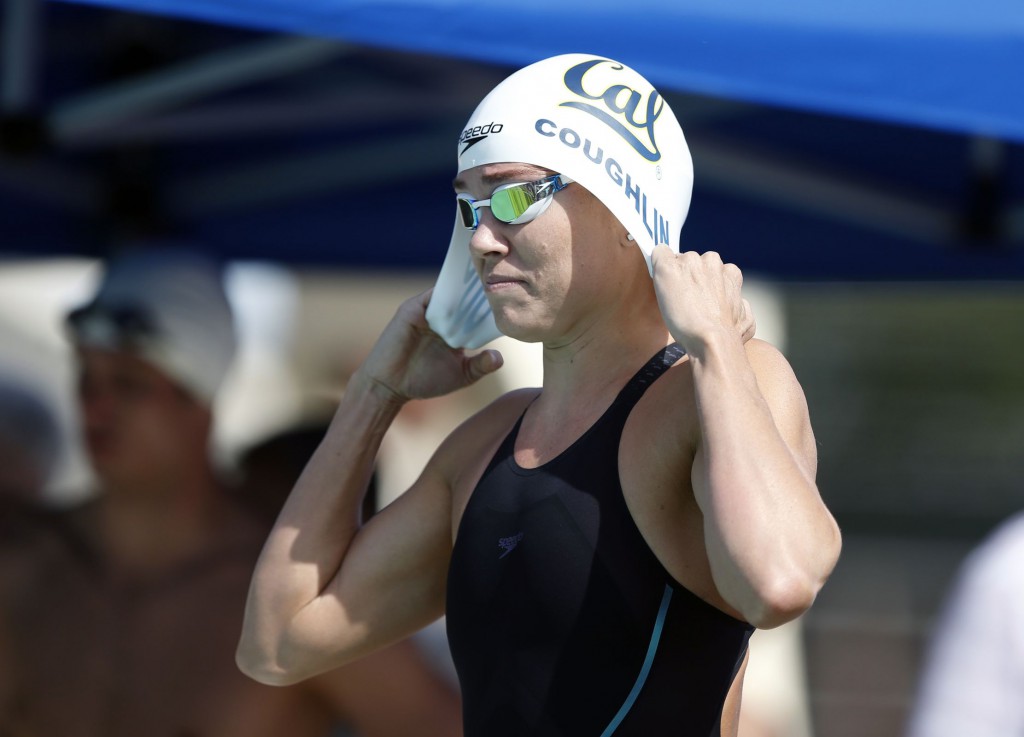
An Appreciation Of 10 Of the Greatest Performances In NCAA History
We know what’s coming. It happens every year. Between Knoxville (women) and Minneapolis (men), the sites of this year’s NCAA Division I Championships, there will be no shortage of spectacular performances. Almost surely, American and U.S. Open records will be established. The crowds will cheer wildly during a celebration of year-end greatness at the collegiate level.
Through the years, certain efforts have been recognized as iconic. Sometimes, there was immediate appreciation. In some instances, time was needed to fully digest what was produced—although the performance eventually received its proper admiration.
Swimming World offers a look (in chronological order) at some of the finest performances in the history of the NCAA Champs.
MARK SPITZ, INDIANA (1972)
100 Yard Butterfly: 47.98
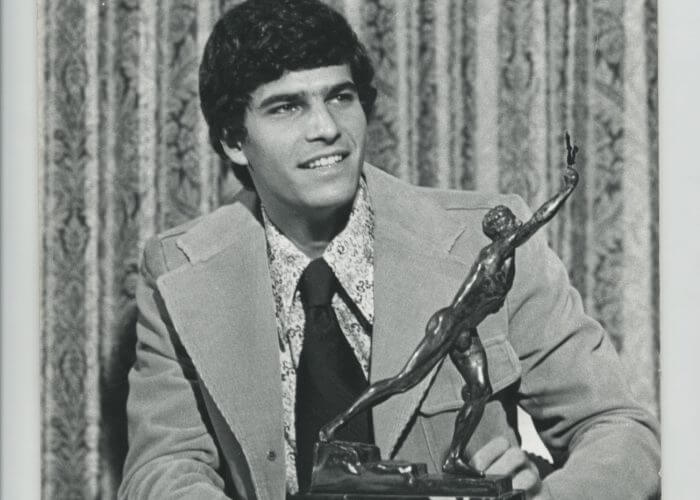
Photo Courtesy: ISHOF Archives
About six months ahead of the 1972 Olympic Games in Munich, Mark Spitz provided a glimpse of what was on the horizon. Racing the 100 butterfly, the Indiana standout popped an American record time of 47.98, which endured as the national standard for five years. As the Hoosiers claimed their fifth consecutive team title, Spitz was also the champion of the 200 fly. That summer, Spitz made history in Munich, where he won seven Olympic gold medals, all in world record time. It was a feat that went unmatched until 2008, when Michael Phelps stormed to eight Olympic golds and seven world records at the Beijing Games.
MATT BIONDI, CAL (1987)
200 Yard Freestyle: 1:33.03
A year before he collected seven medals at the 1988 Olympic Games in Seoul, Matt Biondi flourished at the 1987 NCAA Championships. While he secured titles in the 50 freestyle and 100 freestyle, it was his performance in the 200 freestyle that was astonishing. In claiming the win, Biondi blasted an American record of 1:33.03, a mark that stood for nearly 18 years. More, Biondi’s time was not bettered in the NCAA finals until Arizona’s Simon Burnett popped a 1:31.20 outing at the 2006 edition of the meet. Ahead of his time? That was Biondi.
SUMMER SANDERS, STANFORD (1992)
400 Yard Individual Medley: 4:02.28
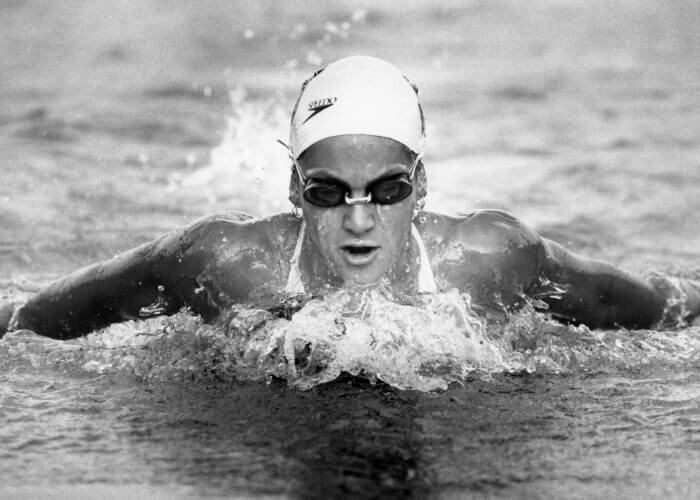
Photo Courtesy: Rod Searcey/Stanford Athletics
Among the three individual victories Summer Sanders claimed at the 1992 NCAA Championships, the 400 individual medley was the definition of dominance. With a mark of 4:02.28, Sanders set an American record that handed her a margin of victory of more than eight seconds over Texas’ Erika Hansen (4:10.60). That record lasted for 15 years and was just one highlight in a stellar 1992 campaign that featured four medals at the Olympics in Barcelona, including a gold in the 200 butterfly.
TOM DOLAN, MICHIGAN (1995)
400 Yard Individual Medley: 3:38.18
As the go-to guy for Michigan’s NCAA championship squad of 1995, Tom Dolan packaged one of the most impressive triples in meet history. The future Olympic champion bested the competition in the 500 freestyle, 1650 freestyle and 400 individual medley. In the 400 IM, Dolan stopped the clock in 3:38.18, a swim that sliced more than two seconds off the American record. Dolan repeated his grueling event trifecta the next year and his American mark lasted for more than 20 years—until Michael Phelps went 3:36.26.
NATALIE COUGHLIN, CAL (2002)
100 Yard Backstroke: 49.97
Heading into the 2002 NCAA Champs, there was considerable discussion about Natalie Coughlin threatening the 50-second barrier in the 100 backstroke and 100 butterfly. Coughlin barely missed in the 100 fly, going 50.01, but her performance of 49.97 in the 100 back was a monumental achievement. Coughlin’s American record time was not bettered at the NCAA Champs until 2017, and the 2002 season also saw Coughlin become the first woman in history to crack the minute barrier in the long course version of the 100 meter backstroke.
FRED BOUSQUET, AUBURN (2005)
50 Yard Freestyle: 18.74
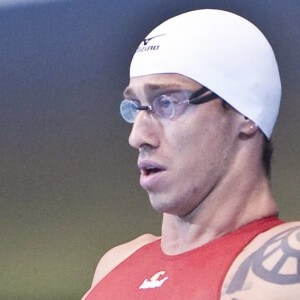
Photo Courtesy: Peter H. Bick
The quest for the first sub-19 effort in the 50 yard freestyle was a multi-year theme at the NCAA Championships, fans of the sport yearning to see 18-something on the scoreboard. At the 2005 meet, Frenchman Fred Bousquet got the job done. As part of a loaded Auburn sprint contingent, Bousquet obliterated the 19-second barrier in the prelims of the 50 free, going 18.74. It was a sight to behold, and ultimately opened the door into special territory. Although Bousquet didn’t match his record time in the final, he produced another sub-19 marker, going 18.90 for gold.
MISSY FRANKLIN, CAL (2015)
200 Yard Freestyle: 1:39.10
The college career of Missy Franklin was abbreviated due to her decision to turn professional after her sophomore season, but it was still a fabulous stint. At the 2015 NCAA Championships, Franklin took the 200 freestyle to a realm that was almost inconceivable, and still has not been matched. Behind a time of 1:39.10, Franklin became the first woman to dip below 1:40, and she accomplished that feat by nearly a second. Franklin’s standard has gone unchallenged since entering the record book, a 1:39.80 from Mallory Comerford in 2018 the closest anyone has come.
KATIE LEDECKY, STANFORD (2017)
500 Yard Freestyle: 4:24.06
Since arriving on the distance scene as a 15-year-old at the 2012 Olympics in London, Katie Ledecky has produced countless mesmerizing performances. Included in the list is her 4:24.06 swim in the 500 freestyle at the 2017 NCAA Champs. In registering that time, Ledecky defeated silver medalist Leah Smith (Virginia) by nearly five seconds, as Smith checked in with a mark of 4:28.90. How dominant was Ledecky? She went through the 200-yard mark in a stunning 1:43.49.
CAELEB DRESSEL, FLORIDA (2018)
50 Yard Freestyle: 17.63
Just 13 years after Fred Bousquet debuted an 18-point swim, Caeleb Dressel struck with a performance that remains otherworldly. Over two laps of sprint freestyle, Dressel dropped jaws with a time of 17.63. Dressel took just 50 yards to generate a 1.01-second gap over runner-up Ryan Held, who put together a splendid mark of 18.64. Through an explosive start, greatness on top of the water and a powerful turn, Dressel altered the landscape of sprinting and what was believed possible. The same competition saw Dressel go 39.90 in the 100 freestyle, making him the first man to break the 40-second threshold.
LILLY KING, INDIANA (2019)
100 Yard Breaststroke: 55.73
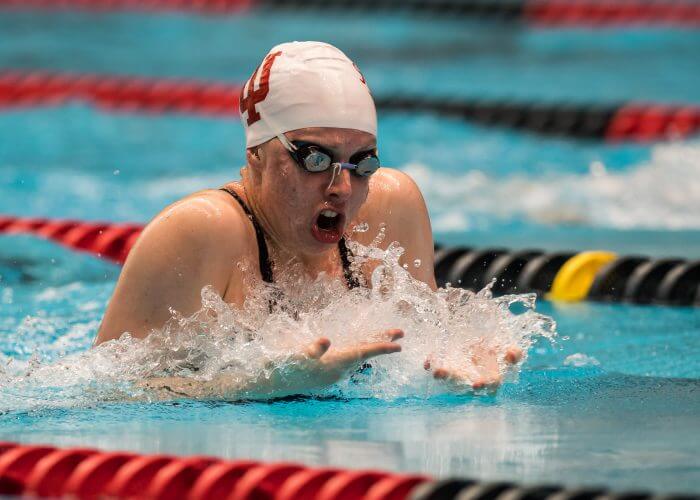
Photo Courtesy: Peter H. Bick
The last of four consecutive NCAA titles in the 100 breast for Lilly King was her most impressive, as she capped her college career with an American record of 55.73 at the 2019 meet. Unchallenged, as evidence by a two-second victory margin, King was racing against the clock. At the touch, the scoreboard flashed a performance that was faster than the winning time at the 1978 men’s NCAA Championships. A day later, King completed a career sweep of the 200 breaststroke, putting an exclamation point on her storied Indiana career.




2022 NCAA, Katie Douglas was the first swimmer to win three NCAA titles in three different strokes.
I’d put Bobby Finke’s 1650 from 2021 ahead of Lilly King. His third 14:12 mile, it wasn’t an American record (which he set at 2020 SEC’s) but it did break the NCAA Championship record by over 10 seconds and he finished over 16 seconds ahead of the second place swimmer.
Spitz’ :47.98 was hugely impressive, but I’ve long been partial to the 200 in which he swam 1:46.89, with his teammate Robert Alsfelder 2nd at 1:51.12, a 4.23 second margin at 200 yards. When Mark finished, no one else was even to the flags. That kind of margin is not that uncommon in races 400 and up, but is still memorable for a 200. Just as Mark’s 100 record lasted 5 years, so also did his 200.
Several of these deserving swims came in meets where the athlete had multiple swims in the same meet which were consideration worthy for this list. Several you mention, (Natalie’s :50.01 fly, Calaeb’s :39.90 free, etc.) There are several other swims arising from the meets described in the article which at least rival the recognized swims.
Biondi’s 1985 200 free was great; in my opinion his 100 free was better. He broke his own 2 year old record by only 0.07 in reaching to :41.80, but that mark lasted 22 years until surpassed by Nathan Adrian in the suited 2009 year. His 1:33.03 200 was above this year’s 1:32.85 invited time (30th, but actually 32nd as both Carson Foster and Marchand were faster but are not entering the event), whereas his :41.80 would still be 12th in this year’s psych sheet. (to be fair, 13th fastest on the year, again due to a not-entered Marchand :41.61.)
Likewise, as impressive as Dolan was in becoming the first 400 IM SCY under 3:40, his first ever under 4:10 500 SCY has better stood the test of time. Dolan was 4:08.75, a time which would still be #1 on this year’s pre-meet psych sheet, by nearly a second over Gabriel Jett’s 4:09.66. His 4:38.18 IM would remain a remarkable 7th entering the 28th NCAA meet since 1995. But again speaking for the 500 v the 400 IM, the record 500 has dropped just 2.43 to Kieran Smith’s 4:06.32, while the 400 IM has been surpassed by 6.61 seconds in Marchand’s 3:31.57.
I’d like to nominate a relay performance by Auburn, even though from suit year 2009 and it only won by 0.14 seconds. While it may fall this year (Florida just 0.11 off the mark at SECs), the team of
1) Andkjaer, Jakob 2) r:+0.24 Louw, Gideon; 3) r:+0.20 Norys, Kohlton 4) r:+0.17 Targett, Matt
r:+0.70 18.89 37.22 (18.33) 55.89 (18.67) 1:14.08 (18.19) set a 1:14.08 mark which has held up through 13 NCAA meets. I’d guess this is the year, but ….
An article on the best overall meet for an individual and/or a team (points, 6 v 6/6, 8/8 scoring comparisons, total titles, % of swims in finals, etc.) could be some fertile swimming literature fun. (…….?)
Amazing records!